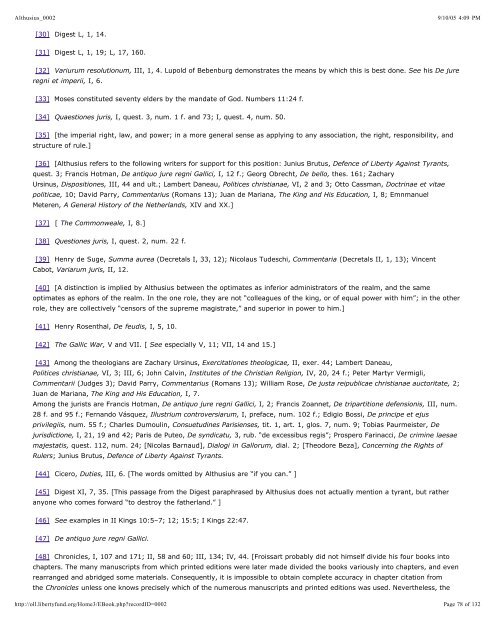Johannes Althusius: Politica - Hubertlerch.com - HubertLerch.com
Johannes Althusius: Politica - Hubertlerch.com - HubertLerch.com
Johannes Althusius: Politica - Hubertlerch.com - HubertLerch.com
You also want an ePaper? Increase the reach of your titles
YUMPU automatically turns print PDFs into web optimized ePapers that Google loves.
<strong>Althusius</strong>_0002<br />
9/10/05 4:09 PM<br />
[30]<br />
[31]<br />
Digest L, 1, 14.<br />
Digest L, 1, 19; L, 17, 160.<br />
[32] Variurum resolutionum, III, 1, 4. Lupold of Bebenburg demonstrates the means by which this is best done. See his De jure<br />
regni et imperii, I, 6.<br />
[33]<br />
Moses constituted seventy elders by the mandate of God. Numbers 11:24 f.<br />
[34] Quaestiones juris, I, quest. 3, num. 1 f. and 73; I, quest. 4, num. 50.<br />
[35]<br />
[the imperial right, law, and power; in a more general sense as applying to any association, the right, responsibility, and<br />
structure of rule.]<br />
[36] [<strong>Althusius</strong> refers to the following writers for support for this position: Junius Brutus, Defence of Liberty Against Tyrants,<br />
quest. 3; Francis Hotman, De antiquo jure regni Gallici, I, 12 f.; Georg Obrecht, De bello, thes. 161; Zachary<br />
Ursinus, Dispositiones, III, 44 and ult.; Lambert Daneau, Politices christianae, VI, 2 and 3; Otto Cassman, Doctrinae et vitae<br />
politicae, 10; David Parry, Commentarius (Romans 13); Juan de Mariana, The King and His Education, I, 8; Emnmanuel<br />
Meteren, A General History of the Netherlands, XIV and XX.]<br />
[37] [ The Commonweale, I, 8.]<br />
[38] Questiones juris, I, quest. 2, num. 22 f.<br />
[39] Henry de Suge, Summa aurea (Decretals I, 33, 12); Nicolaus Tudeschi, Commentaria (Decretals II, 1, 13); Vincent<br />
Cabot, Variarum juris, II, 12.<br />
[40]<br />
[A distinction is implied by <strong>Althusius</strong> between the optimates as inferior administrators of the realm, and the same<br />
optimates as ephors of the realm. In the one role, they are not “colleagues of the king, or of equal power with him”; in the other<br />
role, they are collectively “censors of the supreme magistrate,” and superior in power to him.]<br />
[41] Henry Rosenthal, De feudis, I, 5, 10.<br />
[42] The Gallic War, V and VII. [ See especially V, 11; VII, 14 and 15.]<br />
[43] Among the theologians are Zachary Ursinus, Exercitationes theologicae, II, exer. 44; Lambert Daneau,<br />
Politices christianae, VI, 3; III, 6; John Calvin, Institutes of the Christian Religion, IV, 20, 24 f.; Peter Martyr Vermigli,<br />
Commentarii (Judges 3); David Parry, Commentarius (Romans 13); William Rose, De justa reipublicae christianae auctoritate, 2;<br />
Juan de Mariana, The King and His Education, I, 7.<br />
Among the jurists are Francis Hotman, De antiquo jure regni Gallici, I, 2; Francis Zoannet, De tripartitione defensionis, III, num.<br />
28 f. and 95 f.; Fernando Vásquez, Illustrium controversiarum, I, preface, num. 102 f.; Edigio Bossi, De principe et ejus<br />
privilegiis, num. 55 f.; Charles Dumoulin, Consuetudines Parisienses, tit. 1, art. 1, glos. 7, num. 9; Tobias Paurmeister, De<br />
jurisdictione, I, 21, 19 and 42; Paris de Puteo, De syndicatu, 3, rub. “de excessibus regis”; Prospero Farinacci, De crimine laesae<br />
majestatis, quest. 112, num. 24; [Nicolas Barnaud], Dialogi in Gallorum, dial. 2; [Theodore Beza], Concerning the Rights of<br />
Rulers; Junius Brutus, Defence of Liberty Against Tyrants.<br />
[44] Cicero, Duties, III, 6. [The words omitted by <strong>Althusius</strong> are “if you can.” ]<br />
[45]<br />
Digest XI, 7, 35. [This passage from the Digest paraphrased by <strong>Althusius</strong> does not actually mention a tyrant, but rather<br />
anyone who <strong>com</strong>es forward “to destroy the fatherland.” ]<br />
[46] See examples in II Kings 10:5–7; 12; 15:5; I Kings 22:47.<br />
[47] De antiquo jure regni Gallici.<br />
[48]<br />
Chronicles, I, 107 and 171; II, 58 and 60; III, 134; IV, 44. [Froissart probably did not himself divide his four books into<br />
chapters. The many manuscripts from which printed editions were later made divided the books variously into chapters, and even<br />
rearranged and abridged some materials. Consequently, it is impossible to obtain <strong>com</strong>plete accuracy in chapter citation from<br />
the Chronicles unless one knows precisely which of the numerous manuscripts and printed editions was used. Nevertheless, the<br />
http://oll.libertyfund.org/Home3/EBook.php?recordID=0002<br />
Page 78 of 132







